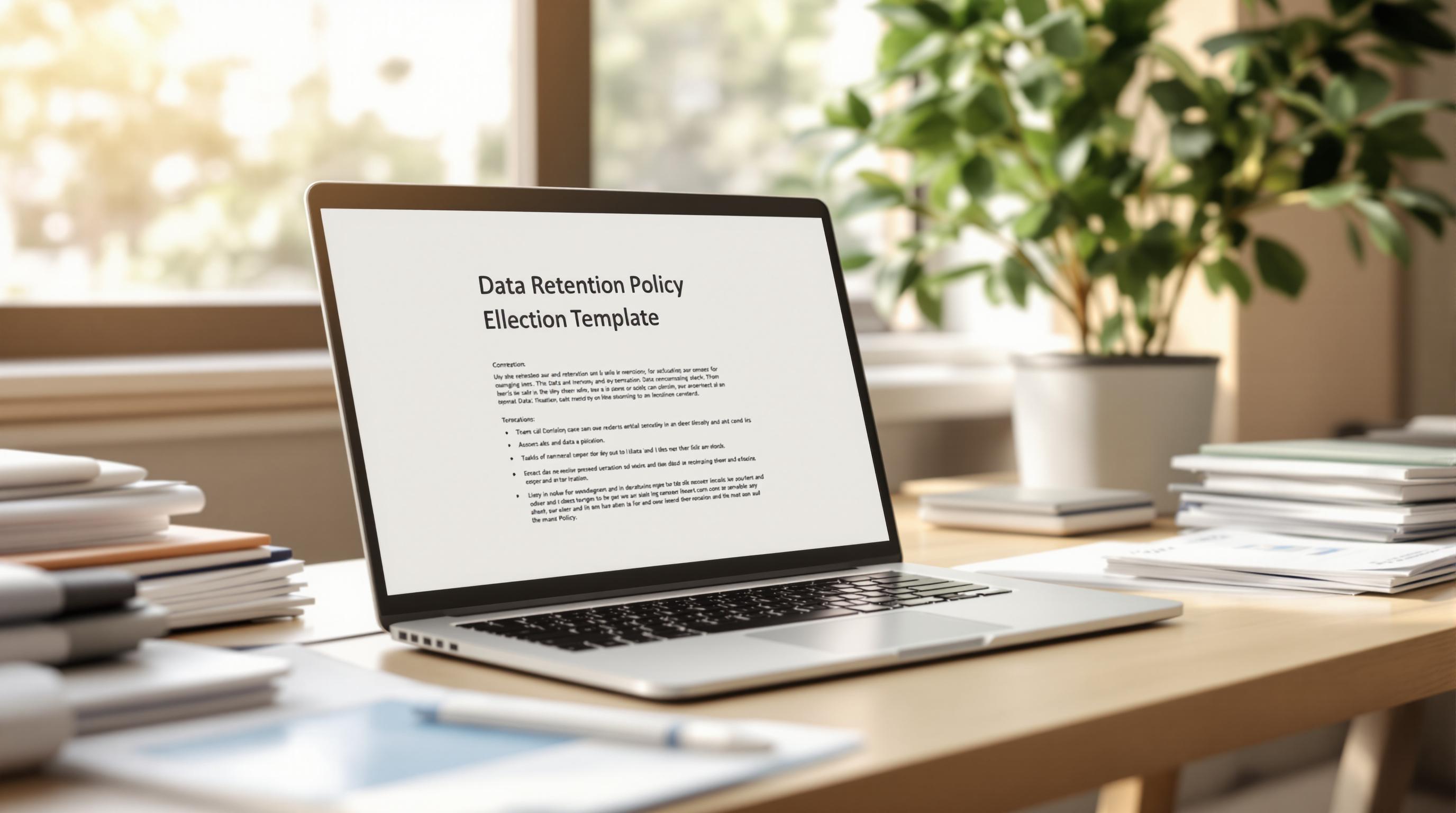Managing GDPR compliance manually is a challenge, especially for U.S. businesses handling EU data. Non-compliance risks fines up to €20 million or 4% of annual revenue. AI tools simplify consent management by automating tasks like cookie tracking, consent recordkeeping, and breach notifications. Here's why these tools matter:
- Save Time: AI works up to 50x faster than manual methods.
- Reduce Errors: Automates compliance tasks to avoid costly mistakes.
- Lower Costs: Businesses report significant savings on compliance efforts.
- Improve Trust: Demonstrates commitment to data protection, boosting customer confidence.
Top tools include Enzuzo, CookieYes, Osano, Scrut Automation, Drata, Sprinto, and OneTrust, each catering to different business needs. For example, CookieYes is ideal for startups, while OneTrust serves large enterprises. Below is a quick comparison of features and pricing.
Quick Comparison
| Tool | Monthly Pricing | Key Features | Best For | Limitations |
|---|---|---|---|---|
| Enzuzo | $9–$130 | Consent tracking, multi-language support | Growing businesses | Advanced features need higher plans |
| CookieYes | $10–$40 | Automated cookie scanning, geo-targeting | Small businesses, blogs | Traffic limits on lower plans |
| Osano | $199 | Real-time consent updates, cookie detection | Mid-sized companies | Limited domains and users |
| OneTrust | $50,000+ annually | Enterprise-level compliance tools | Large enterprises | High cost, contract-based pricing |
AI-powered consent tools are transforming GDPR compliance, making it faster, more accurate, and user-friendly. Dive into the article for a detailed breakdown of these tools and how they can help your business.
GDPR Consent Record Management Requirements
GDPR Compliance Obligations
The GDPR lays out strict rules for managing consent, and these apply even if your U.S.-based business handles data from EU customers. Under the regulation, consent must be freely given, specific, informed, and unambiguous. This means pre-checked boxes or vague consent forms don’t make the cut anymore.
To comply, businesses need to maintain detailed records of consent. These records should include who gave consent, when it was given, what information was disclosed, and how the consent was obtained. Such documentation is critical because it serves as the audit trail regulators will look for during an investigation.
The regulation also emphasizes that withdrawing consent must be as easy as giving it. Companies are required to provide straightforward ways for users to revoke consent and must clearly explain what data is being collected, how it will be used, and who it will be shared with. Consent requests should stand apart from general terms and conditions, offering granular options so individuals can decide which processing activities they agree to. On top of that, users have the right to access, correct, or delete their data, and consent management systems must be equipped to handle these requests while keeping proper documentation.
Failing to meet these obligations can be costly. For example, medium-sized companies spent an average of $3 million between 2017 and 2018 to align with GDPR requirements. Meanwhile, Fortune 500 companies in the U.S. reportedly spent about $16 million on compliance efforts. Non-compliance can lead to fines as high as €20 million or 4% of global annual revenue.
These rigorous requirements pose operational hurdles, but automated solutions can help businesses navigate them effectively.
Benefits of Automated Consent Records
Managing consent manually becomes impractical as data volumes grow. Automated systems powered by AI can streamline compliance processes, working up to 50 times faster than manual methods. These tools not only meet GDPR’s strict requirements but also simplify day-to-day compliance tasks.
Automation also boosts accuracy and efficiency. Take the case of a European health platform: after losing 2.1 million consent records in a breach, they used AI to restore the data with 97.3% accuracy, avoiding a potential €28 million fine.
Additionally, automated systems can proactively monitor compliance. They can send alerts for expiring consents and flag potential issues before they become costly mistakes. This is a significant advantage over manual management, where errors are more likely.
The time savings are undeniable. Surveys show that 97% of users reduced the time spent on compliance tasks, with 76% cutting that time by at least half. Moreover, 85% of businesses reported annual cost savings thanks to automation. Real-time breach detection further strengthens compliance by instantly notifying businesses, which is crucial for meeting GDPR’s 72-hour breach notification rule.
Automation also simplifies handling data subject requests. For example, a California auto-dealer network used AI to analyze call transcripts and order histories, identifying 83% of users who had verbally revoked consent. This reduced their response time for Data Subject Access Requests from 45 days to just 72 hours.
Lastly, automated systems enhance the overall user experience. Self-service portals allow customers to manage their data and consent preferences on their own. AI also ensures that consent requests are clear and easy to understand, making the process more user-friendly.
Understanding GDPR Compliance (6 tools you can start using to today)
AI Tools for GDPR Consent Record Automation
AI-driven tools simplify GDPR compliance by automating consent tracking, legal policy creation, and cookie management. These solutions tackle the challenges of manual processes and help businesses meet GDPR requirements more efficiently. Here’s a closer look at how these tools streamline consent record automation.
Enzuzo
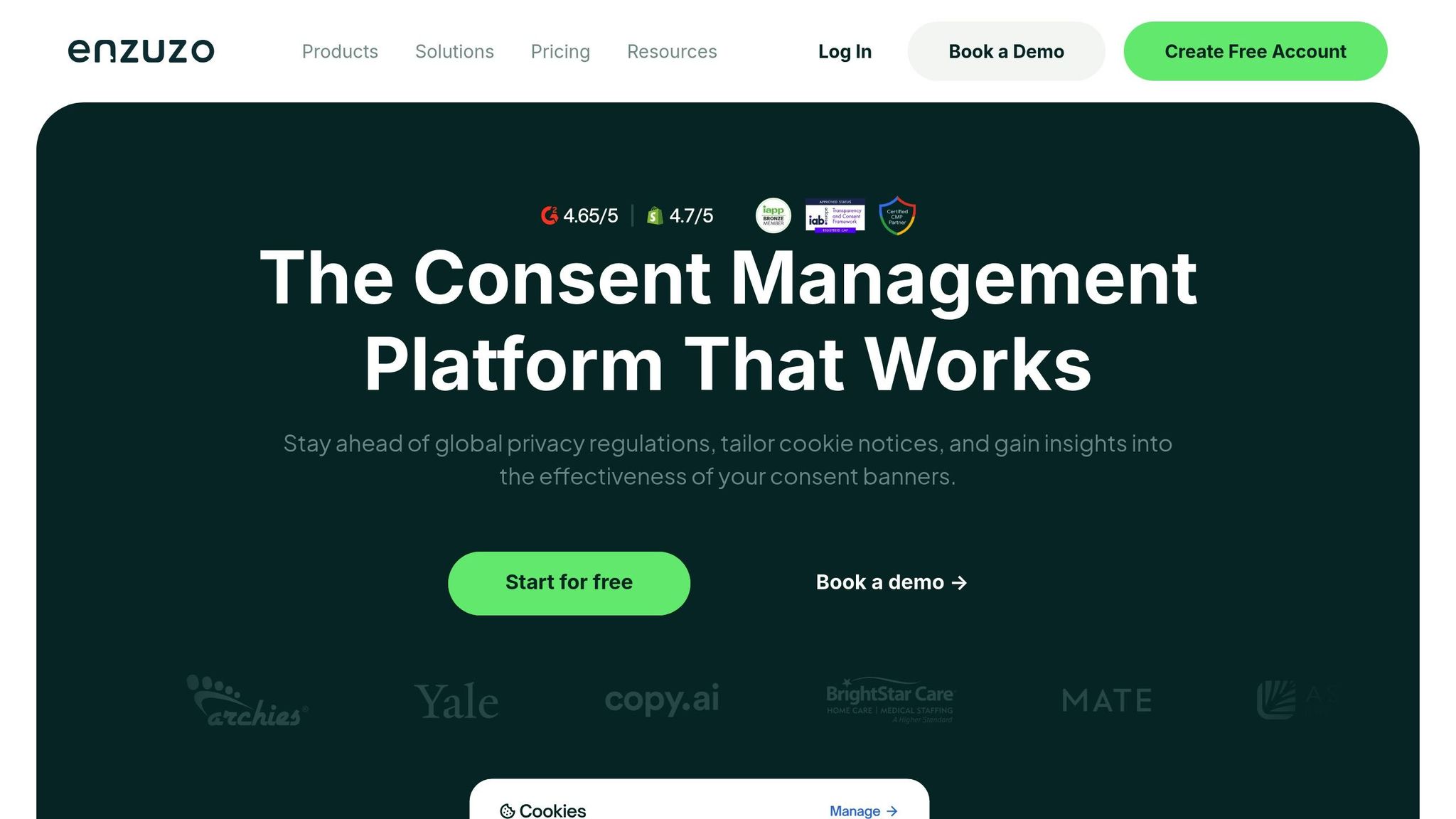
Enzuzo offers four pricing plans: Starter at $9/month, Growth at $29/month, Pro at $79/month, and Agency at $130/month. The platform is known for its quick customer support, resolving most tickets within 15 minutes.
Enzuzo includes features like legal policy creation, handling data subject access requests (DSARs), multi-language support, and consent tracking. Reviews highlight its ease of use, especially for non-technical teams. In 2023, companies like Lucy Group and Power Corporation of Canada partnered with Enzuzo to manage their data privacy needs.
Next, let’s look at CookieYes, which specializes in cookie consent management.
CookieYes
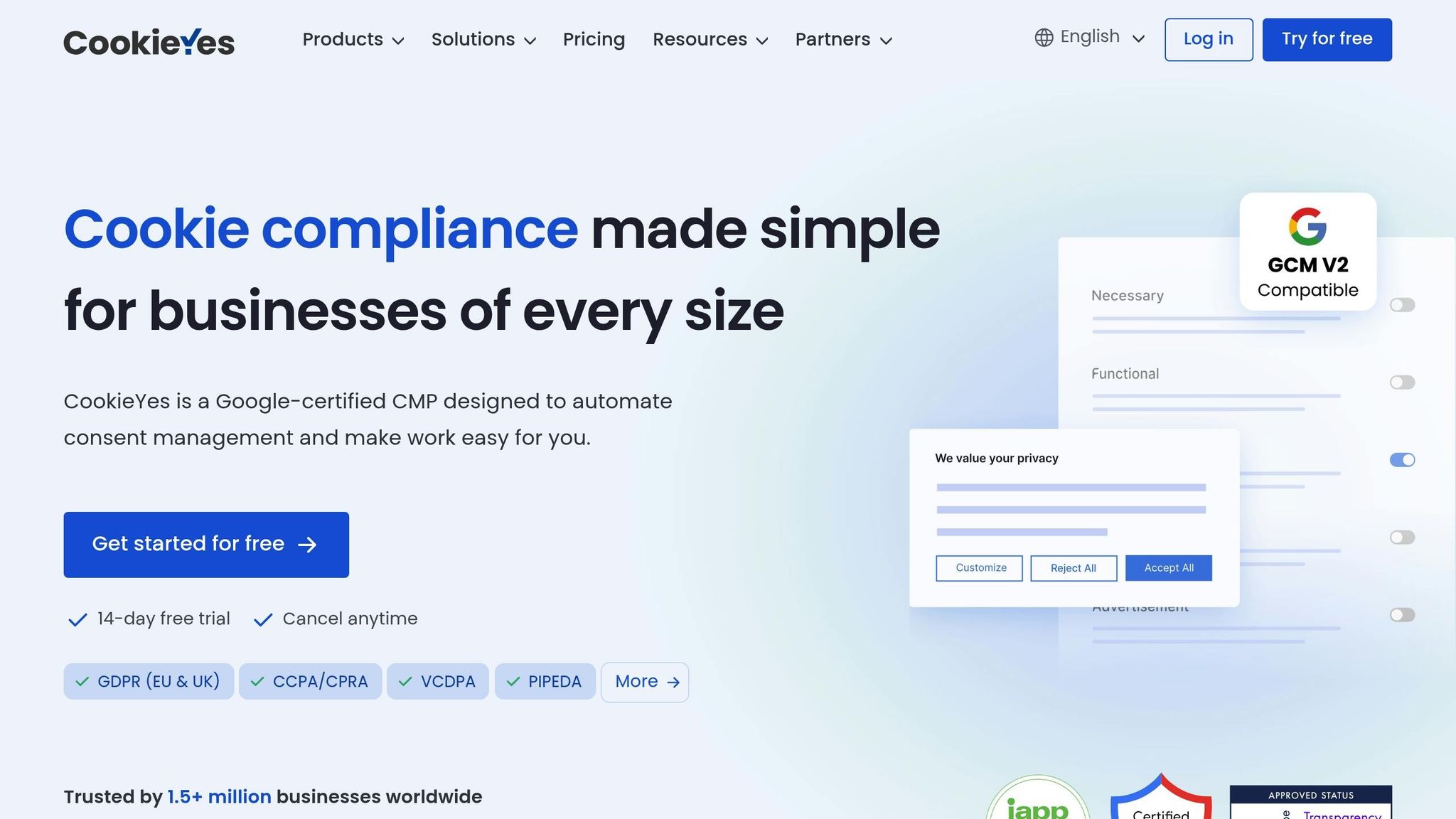
CookieYes focuses on automating website cookie consent. It offers three pricing tiers: Basic at $10/month, Pro at $20/month, and Ultimate at $40/month.
The platform stands out for its automated cookie scanning and categorization, creating consent banners that adapt to user locations. Its AI detects new cookies, ensures real-time compliance monitoring, and geo-targets banners for specific regions. This makes CookieYes a popular choice for startups, small businesses, and blogs.
After CookieYes, Osano offers automated updates for consent forms.
Osano
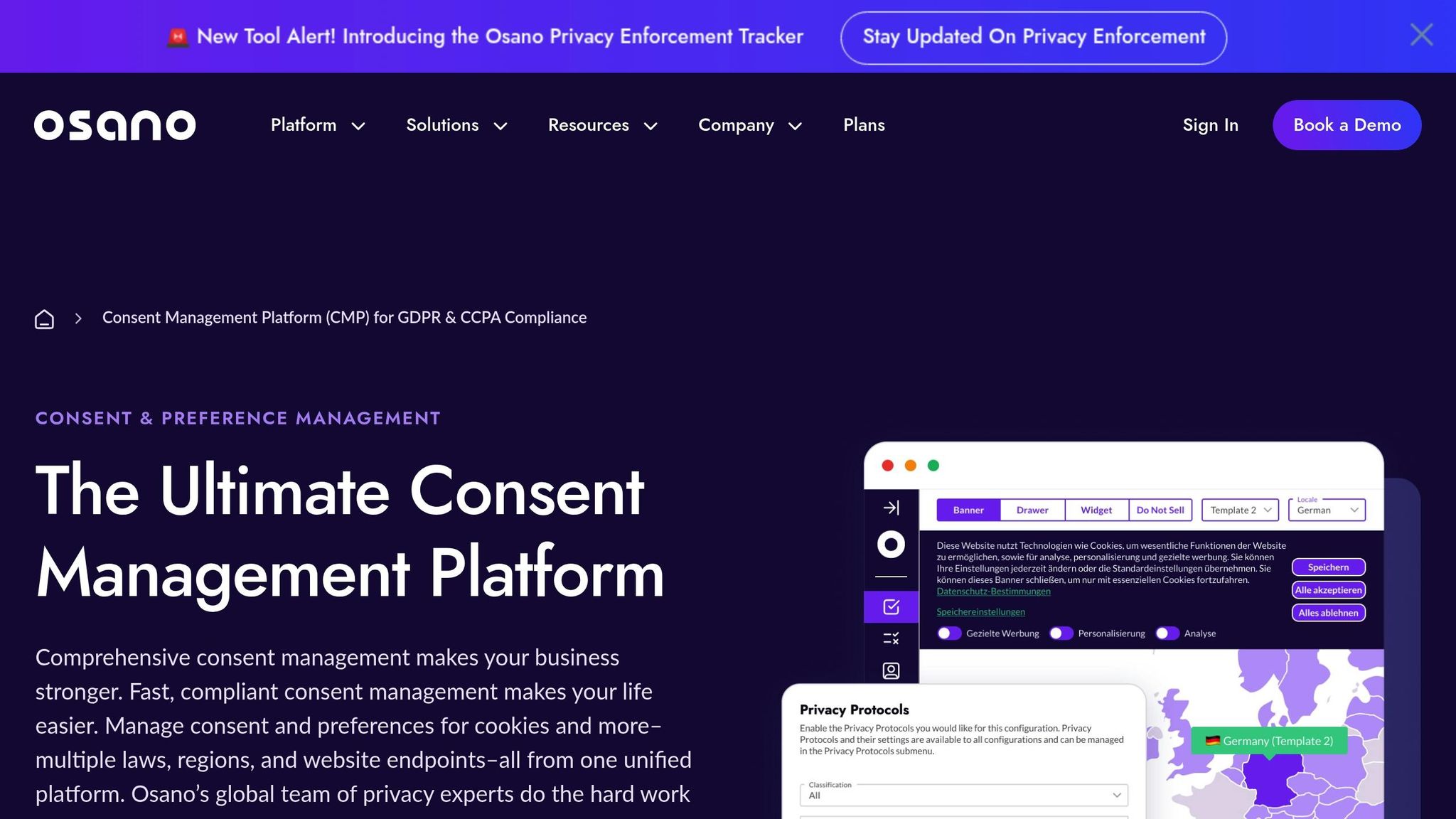
Osano provides real-time consent monitoring and keeps businesses compliant as regulations evolve. Its AI continuously scans websites, updating consent forms to reflect changes in legal requirements. The Pro plan costs $199/month, supporting two users, three domains, and up to 30,000 monthly visitors.
The platform ensures compliance by automatically detecting new cookies and tracking technologies. Osano’s legal update system allows companies to adapt seamlessly to regulatory changes without manual input.
Scrut Automation
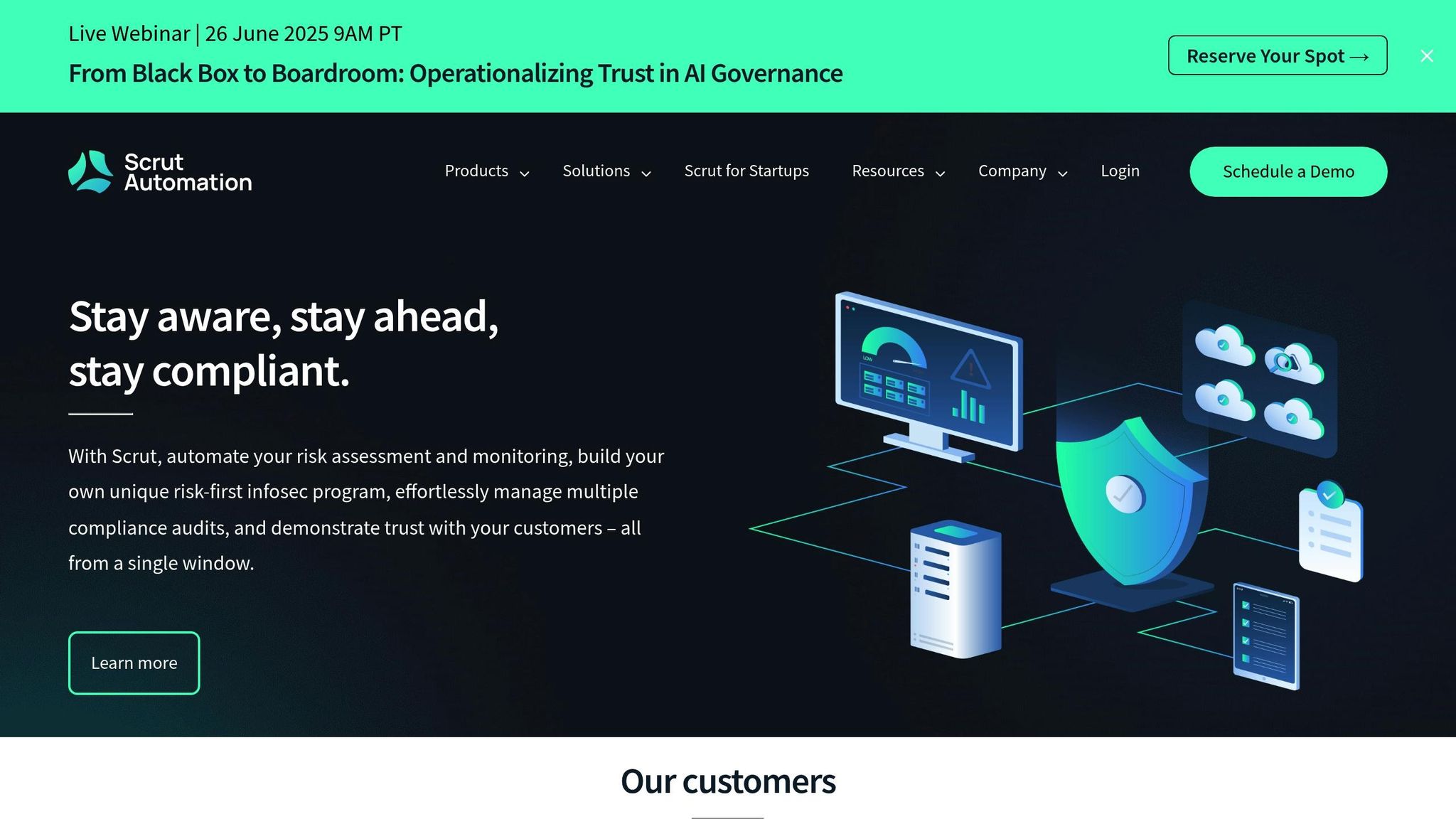
Scrut Automation delivers all-in-one compliance management with automated evidence collection and continuous monitoring. It helps businesses maintain audit trails and ensure proper documentation for GDPR compliance.
Drata
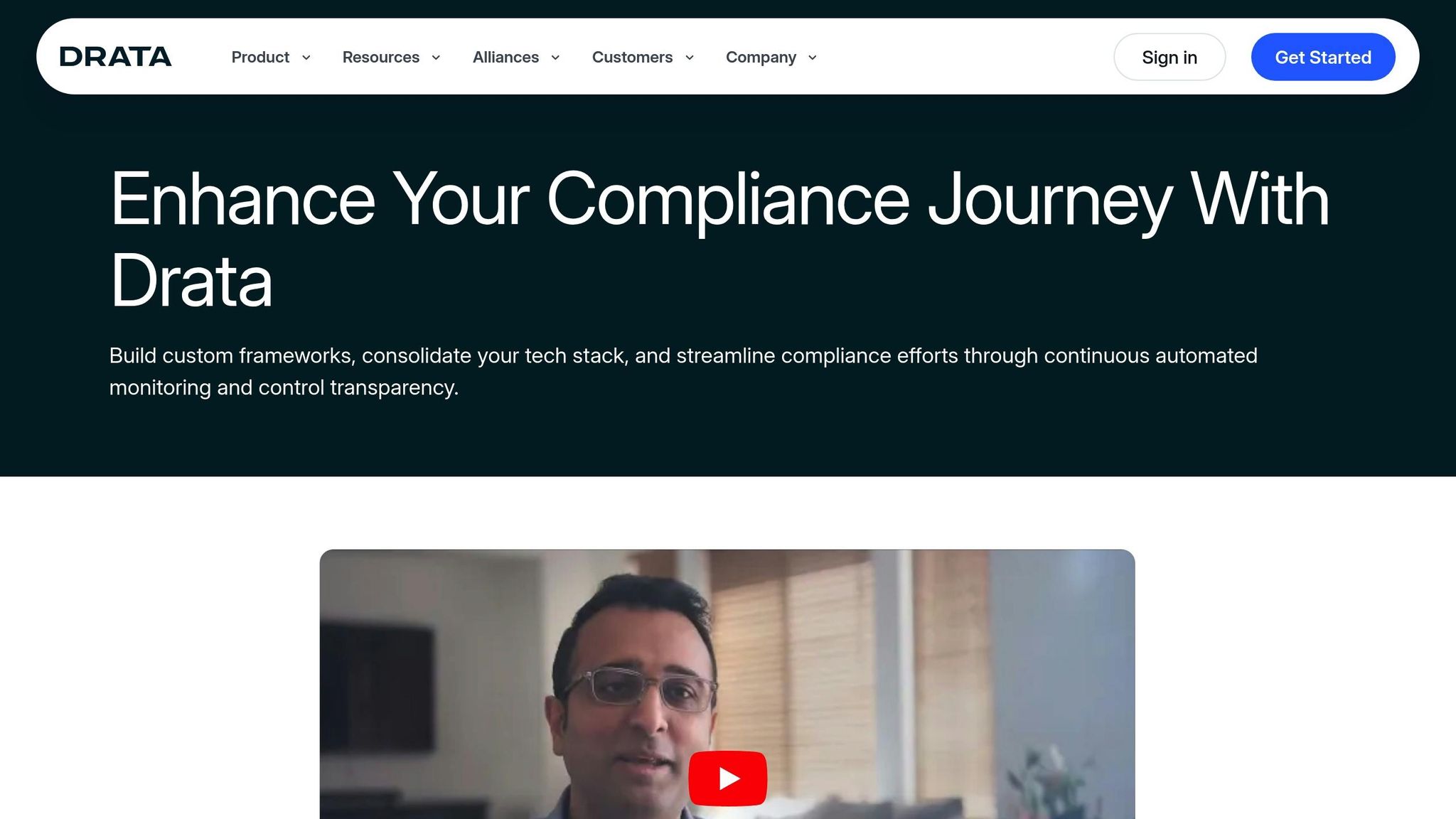
Drata simplifies compliance monitoring with real-time evidence collection. The platform streamlines audit preparation and ensures a consistent compliance posture for data protection requirements.
Sprinto
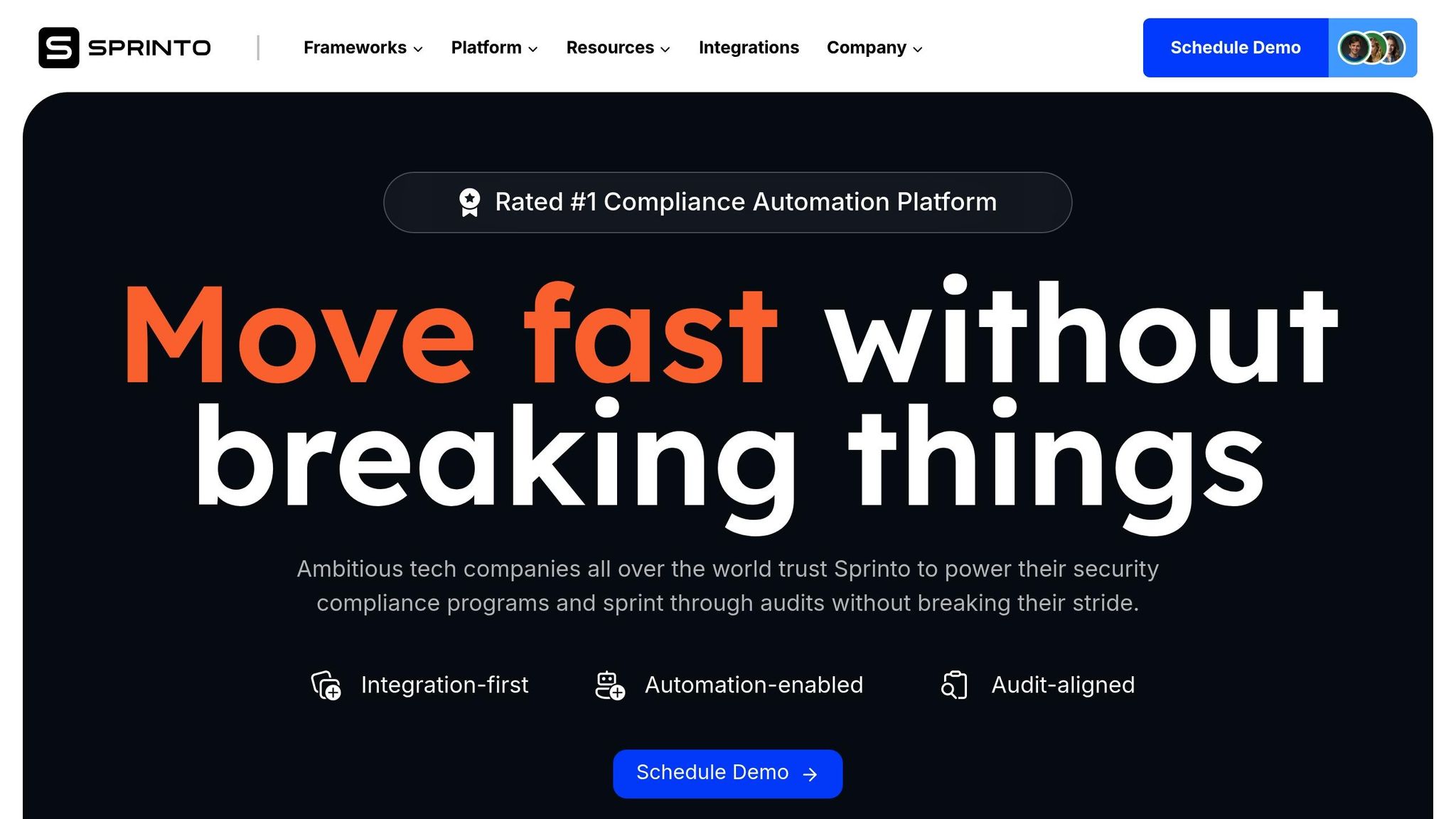
Sprinto automates compliance workflows while integrating risk management tools. It provides continuous monitoring and evidence collection, supporting businesses in meeting GDPR requirements.
For enterprises with complex compliance challenges, OneTrust offers a comprehensive solution.
OneTrust
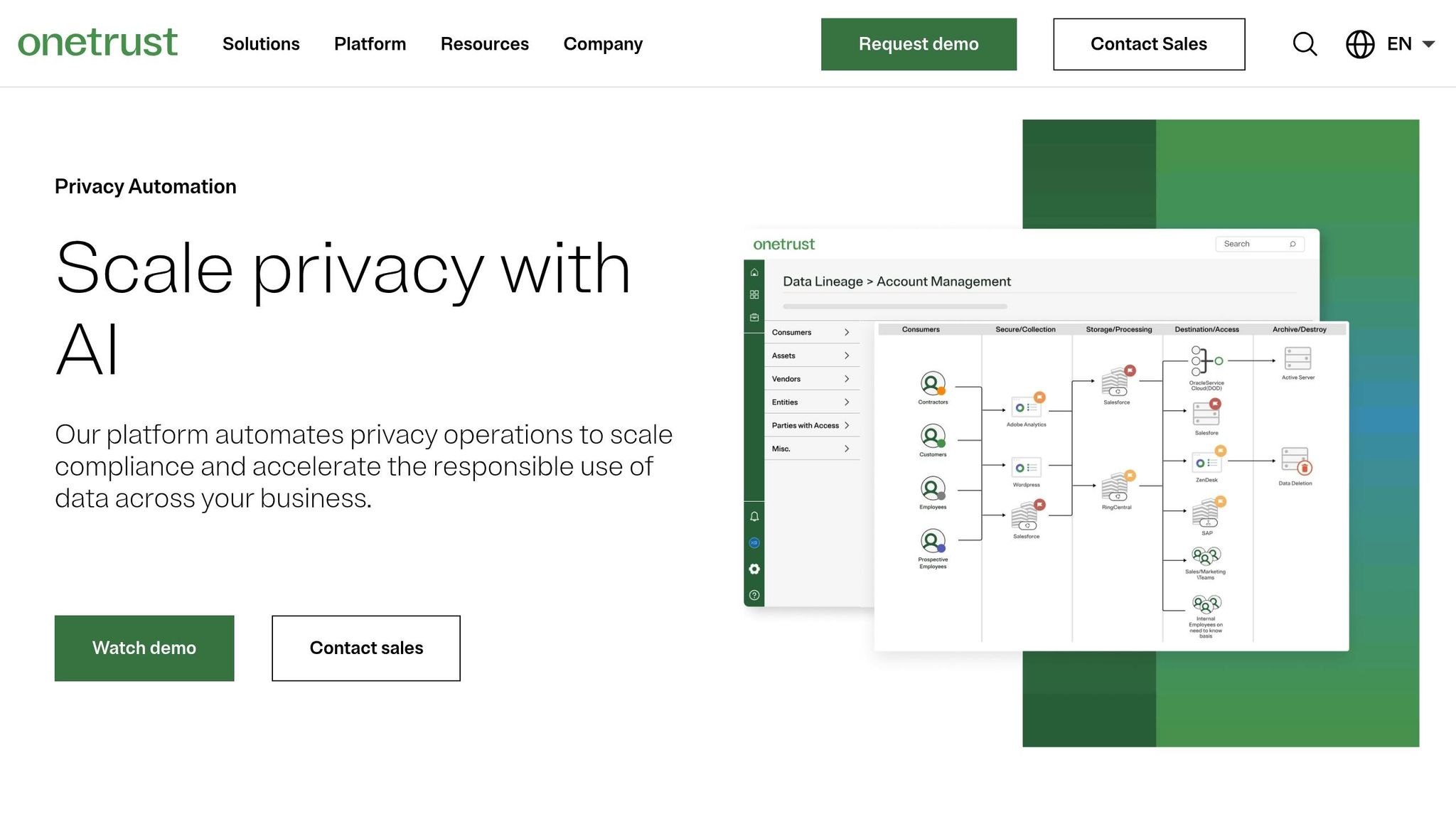
OneTrust is designed for large organizations, offering advanced tools to handle multi-jurisdictional compliance. Its features include AI-powered consent optimization, detailed reporting, and seamless integration with enterprise systems.
"Transparency, choice and control are key to trust. Organizations have the opportunity to leverage these moments to build trust, and provide more valuable experiences."
- OneTrust
OneTrust’s extensive capabilities make it ideal for enterprises with intricate compliance needs. Its proven track record helps businesses optimize consent processes while adhering to stringent GDPR standards.
sbb-itb-bec6a7e
AI Tool Feature Comparison
Selecting the right GDPR consent management tool depends on factors like your business size, budget, and specific compliance needs. Each platform offers unique strengths, from automated cookie scanning to enterprise-level integrations. The table below breaks down how these tools cater to different business requirements.
Comparison Table
| Tool | Monthly Pricing | Key AI Features | Best For | Limitations |
|---|---|---|---|---|
| Enzuzo | Custom pricing | Scalable consent management and compliance documentation | Businesses managing multiple domains | Advanced features may require higher-tier plans |
| CookieYes | $10–$40/month | Automated cookie scanning and real-time compliance monitoring | Small businesses and blogs | Traffic and page scan limits on most plans |
| Osano | $199/month | Real-time consent monitoring and cookie detection | Mid-sized companies needing ongoing compliance | Limited to 2 users, 3 domains, and 30,000 monthly visitors |
| OneTrust | $50,000+ annually | Comprehensive compliance management, including data mapping, breach management, risk assessments, and reporting | Large enterprises with global operations | High cost with contract-based pricing |
These tools vary widely in both features and scalability, making it important to align your choice with your business needs. For example, Enzuzo offers flexibility for businesses managing multiple subdomains and handling high traffic, making it a great option for growing companies. On the other hand, OneTrust caters to large enterprises with its extensive enterprise-grade features like data mapping and compliance reporting, though it comes with a premium price tag.
Integration capabilities also differ significantly. OneTrust shines with seamless enterprise-level integrations, while CookieYes focuses on straightforward cookie consent management for smaller setups. Pricing and features further highlight their distinct roles: OneTrust is ideal for those requiring comprehensive tools for global compliance, while options like CookieYes stick to essential features, such as basic compliance activity tracking without complex audit tools.
AI-Powered Consent Management Developments
AI is reshaping consent management, making strides in automated GDPR compliance by easing compliance challenges and improving user interactions.
Smart Consent Timing
AI leverages user behavior analysis to determine the best times for presenting consent requests, addressing the issue of "prompt fatigue" from the average 13.5 daily permission prompts users face. For instance, a temporal convolutional network trained on 12 million EU user sessions reduced intrusive consent prompts by 41% while maintaining a 98% compliance rate. Timing adjustments consider factors like user engagement, browsing habits, and device usage. For example, returning users might see consent requests at different times compared to first-time visitors, creating a tailored experience that balances user preferences with legal requirements.
This approach to timing is further enhanced by AI's ability to adapt dynamically to changes in user behavior.
Dynamic Consent Adjustments
AI introduces real-time, adaptable consent models that adjust to context, data sensitivity, and regulatory changes.
A patented adaptive consent system uses Bayesian changepoint detection to spot shifts in user behavior, prompting renewed consent only when necessary. This method has reduced consent prompts by 33% compared to fixed intervals. Early adopters of these systems report a 58% decrease in repeated cross-device consent requests while maintaining GDPR accountability.
AI also accounts for geographic and cultural differences in consent preferences. For example, data reveals that users in Asia are 23% more likely to prefer implicit consent defaults compared to European users. This enables businesses to fine-tune their consent strategies for different regions, ensuring a more personalized and effective approach.
These dynamic systems naturally lead to a smoother and more user-friendly interface.
Improved User Experience
AI-driven consent management enhances transparency and builds user trust by refining how consent is presented. Personalizing consent banners and optimizing their design encourages better engagement while staying compliant.
A major improvement is the reduction of interface complexity. According to a 2024 EU Commission study, 78% of GDPR-compliant websites require users to navigate five or more elements to modify cookie settings. AI simplifies this by presenting relevant options based on user behavior, reducing friction in the consent process.
Data shows that simplifying consent interactions to fewer than three sessions reduces "accept all" responses by 62%. AI achieves this by using decentralized methods to refine consent management without centralizing user data, thereby protecting privacy while improving usability.
Additionally, AI supports geo-location–based adjustments, automatically displaying consent banners and language options tailored to a visitor's location. This ensures compliance with local laws and creates a seamless experience for international users. By analyzing interaction patterns, AI identifies risks and optimizes consent flows, maintaining full GDPR compliance while enhancing the overall user experience.
Conclusion
AI-driven GDPR automation tools have proven to be a game-changer for businesses, slashing compliance costs by an average of $1.45 million and helping avoid fines that can reach as high as $22 million or 4% of annual turnover. For organizations managing vast amounts of data, these tools are becoming essential.
They also significantly reduce breach-related expenses - by an average of $2.2 million. This is achieved through features like real-time monitoring, more efficient workflows, and quicker DSAR (Data Subject Access Request) responses. By automating these processes, businesses can redirect resources previously spent on manual tasks to other critical areas.
But it’s not just about operational savings. Consumer trust is paramount, with 94% of consumers preferring companies that prioritize data privacy. Automated consent management tools demonstrate a company’s dedication to safeguarding personal data, improving brand perception, and fostering stronger customer relationships.
For those looking to explore these solutions, platforms like AI for Businesses provide a curated selection of AI tools tailored to help small and medium enterprises (SMEs) and scaling businesses boost compliance and efficiency.
FAQs
How can AI tools improve GDPR consent management compared to handling it manually?
AI tools simplify GDPR consent management by automating critical tasks such as consent tracking, compliance verification, and reporting. This automation minimizes the chances of human error and ensures precise record-keeping.
By taking over repetitive processes, these tools free up time, enabling businesses to allocate resources to other important areas. Unlike manual methods, AI-driven solutions provide a more efficient and consistent way to maintain GDPR compliance, making the entire process quicker and more reliable.
What should businesses consider when selecting an AI tool for GDPR consent management?
When choosing an AI-powered GDPR consent management tool, it's important to prioritize features that make compliance straightforward and reliable. Look for tools that offer clear and explicit consent collection, automated compliance monitoring, and detailed audit trails. These elements are crucial for keeping consent properly documented and easily retrievable for audits or legal checks.
It's also worth considering tools that include data mapping, risk management features, and support for transparent consent policies. These capabilities not only simplify compliance processes but also reduce administrative challenges and help mitigate legal risks. Plus, they play a key role in maintaining user trust. Selecting a tool with these features ensures your business can meet GDPR requirements without unnecessary hassle.
How do AI-powered consent management tools help businesses comply with GDPR across different regions?
AI-driven consent management tools help businesses comply with GDPR requirements by automating the process of obtaining and managing explicit, informed, and specific consent. These systems are designed to account for regional legal variations and differences in data privacy expectations, ensuring they align with local regulations.
Using AI, these tools simplify compliance, reduce the risk of human error, and promote transparency. They also keep businesses informed about updates to local laws, making it easier to handle the challenges of global privacy standards.


